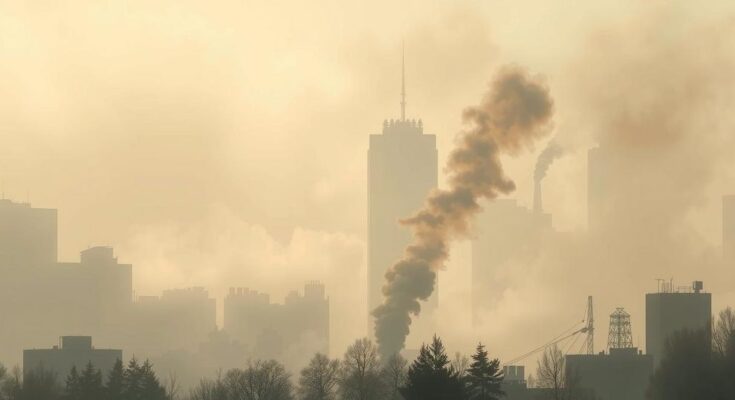In 2024, Pakistan ranked third globally in pollution due to a severe smog crisis, which has had dire public health implications. The World Air Quality Report indicated PM2.5 levels were 15 times above WHO’s safe limit, with major cities suffering significantly. With around 70% of the population facing health issues from smog, experts are calling for urgent policy action.
In 2024, Pakistan was designated as the third most polluted country globally, exacerbated by an unprecedented smog crisis that has significantly harmed public health. The World Air Quality Report indicated that Pakistan ranks behind Chad and Bangladesh for air pollution, with the Democratic Republic of Congo and India following in fourth and fifth places, respectively. The report highlighted that the average concentration of PM2.5 in Pakistan reached 73.7 micrograms per cubic meter, which is 15 times the World Health Organization’s safe limit.
The smog crisis had dire implications, particularly in Punjab, where record levels of air pollution led to its declaration as a calamity. Nearly two million citizens required medical care for pollution-related problems, prompting the government to implement lockdowns and close schools in the hardest-hit areas. Despite these measures, there were no significant changes in overall air quality when compared to 2023, as stated in the report.
Major cities such as Lahore, Multan, Peshawar, and Sialkot ranked among the 15 most polluted urban areas in Central and South Asia. Pakistan faced persistent pollution due to various factors, including biomass burning, industrial discharges, vehicular emissions, brick kiln operations, and construction-related dust. In contrast, Karachi’s PM2.5 levels showed a decrease from over 55 μg/m³ in 2023 to approximately 46 μg/m³ in 2024.
A survey conducted by Ipsos revealed alarming health impacts, with approximately 70% of Pakistan’s populace reporting health issues linked to smog pollution. As air quality continues to decline, environmental specialists advocate for immediate policy measures to address the escalating crisis and safeguard the health of the nation.
Pakistan’s third-place ranking in global pollution underscores a severe air quality crisis that poses significant health threats to its citizens. With urgent interventions necessary to mitigate the effects of smog, the report calls for policymakers to prioritize environmental health and implement comprehensive strategies to improve air quality and protect public health. Without decisive action, the implications of this crisis will likely continue to worsen, affecting the nation’s well-being.
Original Source: www.republicworld.com




